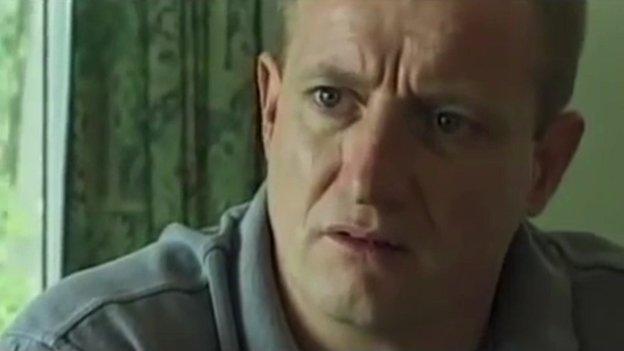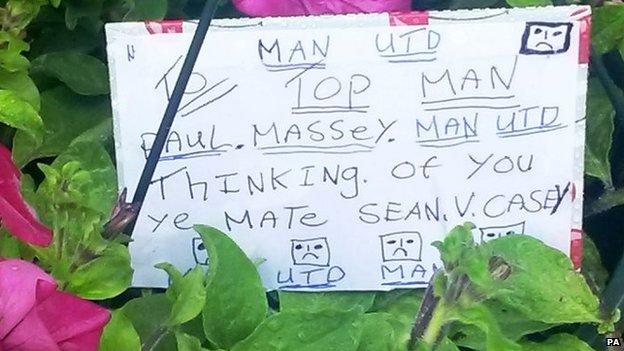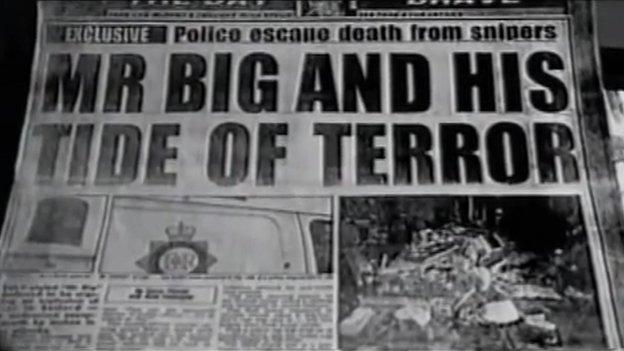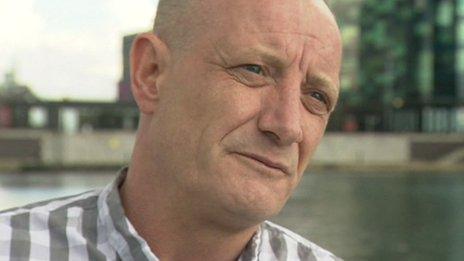Paul Massey death: Who was Salford's Mr Big?
- Published

Paul Massey, who realised he "could be shot dead any time", didn't look like an "archetypal gangster"
The death of Paul Massey - once dubbed Mr Big in light of his criminal past - has prompted a flood of tributes. But how did the businessman earn the fearsome moniker?
Floral tributes and social media posts commemorate Salford-born Massey - shot dead in a suspected "targeted attack" - as a "top man" and "true gent".
But he was also a convicted criminal, having been sentenced to 14 years in 1999 for stabbing a man in the groin outside a nightclub.
Despite this, Massey, who once stood for mayor, was well-liked and respected by many in Salford.
But how did a man with a criminal record convince people to vote for him?
According to author Peter Walsh, who described Massey as "a Salford lad to the end", part of his appeal lay in his loyalty to his roots.
"He wasn't one of these guys who made a lot of money, moved out of the area, changed the way he dressed or the people he associated with," he said.
"Part of his thing really was he always stayed loyal to his area. His friends were very loyal to him and thought very highly of him."
Rave scene
Massey grew up in Ordsall in the 60s, a part of Salford where slum clearance was taking place.
When he was 12 he was arrested for criminal damage to an empty house and sent to approved school.
He claimed his "bitterness against the system" stemmed from being "dragged away from his mother and father".
"He had a strong anti-authority streak," said Mr Walsh, who wrote Gang War: The Inside Story of the Manchester Gangs.
"He wasn't the biggest, he wasn't the toughest, but he was quite charismatic and very principled in his own way.
"He always looked like an overgrown street kid really, dressed in jeans and trainers.
"He was unusual because he defied expectations. He didn't look like a gangster, he didn't lord it over people. He wasn't someone who saw himself sitting at the top of a pyramid as the boss."
It was the arrival of the rave scene in Manchester, and his gang's forced closure of the famous Hacienda nightclub, that helped build his reputation further.

"They would run what you could jokingly call security at the event, and they started smuggling ecstasy in from Holland and selling that," Mr Walsh said.
"By then they were well on the way to becoming one of the city's recognised gangs."
He was given the title Mr Big by the late Salford councillor Joe Burrows at a town hall meeting to discuss civil disturbances in 1992.
Massey denied having anything to do with the unrest.
Mayoral campaign
He declared he wanted to keep heroin off the streets of Salford and stickers appeared on lamp-posts warning: "Don't deal smack or you'll get a crack."
Massey stood unsuccessfully to be mayor of Salford in 2012.
His political ambition wasn't surprising, as he had often acted as a "conciliator" between warring factions, and became a senior figure in the city's gangland.
Dr David Holmes, a criminal psychologist at Manchester Metropolitan University, said: "Going for mayor when you have that kind of history and that kind of past is sticking your neck out quite a bit.
"They don't want to be in constant conflict with the police - they want to be kind of accepted and his level of control over a community produces respect from people.

The late Salford councillor Joe Burrows bestowed the Mr Big nickname on Massey
"This is the basic mechanism of how gangland culture becomes accepted for communities and you get this outpouring of grief if something like this happens.
"If you're one of their mates, friends, if you are OK with them you no longer have to fear them. That's why these guys will project themselves as kind of a community leader."
Massey received 1,995 votes - 4.45% of the poll - and came seventh out of 10 candidates.
But how did a man with a criminal past convince people to vote for him?
"He had a great deal of name recognition. Within his own community he was a mini celebrity really", said Mr Walsh.
"He was generally good at talking to people but if you crossed him or his friends there would be trouble.
"Although he achieved Robin Hood status there was a dark, troubling side. He might say that was a product of the area he came from.
"I am surprised he has been killed at the age of 55, when you would expect him to have this senior status. If it had happened in his mid-twenties I wouldn't have been surprised."
- Published27 July 2015
